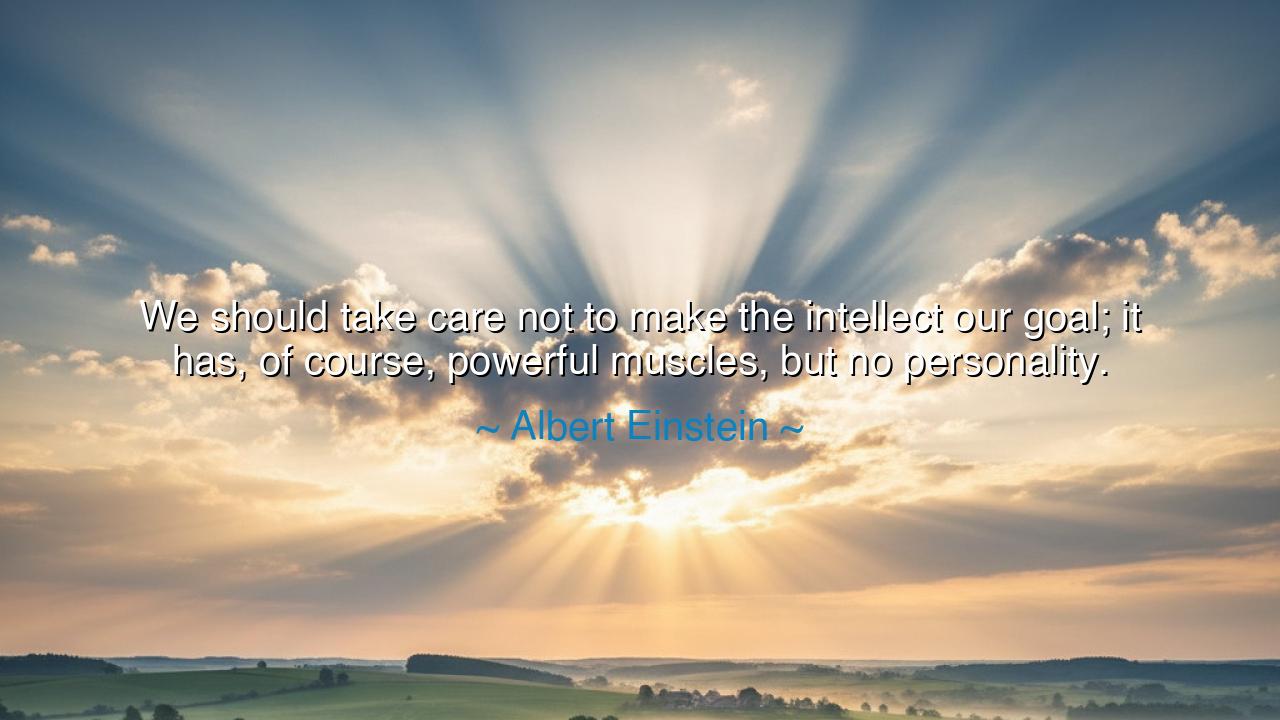
We should take care not to make the intellect our goal; it has
We should take care not to make the intellect our goal; it has, of course, powerful muscles, but no personality.






The Soul Beyond the Mind
From the luminous mind of Albert Einstein, whose thoughts bent the fabric of the universe itself, comes a warning as timeless as it is wise: “We should take care not to make the intellect our goal; it has, of course, powerful muscles, but no personality.” These are not the words of a man against knowledge, but of one who had seen its limits. Einstein, who unlocked the secrets of time and space, understood that intellect, though mighty, is only a tool—a sharp blade that can build or destroy depending on the hand that wields it. In this saying, he reminds us that intelligence without character is empty, and that the highest goal of humanity is not brilliance, but wisdom—a harmony of mind and soul.
The meaning of this quote lies in the distinction between the intellect and the self. The intellect can analyze, calculate, and create; it can design engines, measure stars, and build empires. But it cannot feel compassion, cannot love, cannot imagine goodness. It is an instrument—precise, cold, and without personality. Einstein cautions that when a civilization worships intellect as its god, it becomes clever but soulless, efficient but cruel. For intellect alone has no conscience, no beauty, no sense of purpose. It can tell you how to build a machine, but not whether that machine should exist. Thus, the intellect must be guided by something higher—the heart, the conscience, the imagination that gives meaning to thought.
The origin of this wisdom can be found in Einstein’s own life. Though revered as a scientist, he was also a philosopher and humanist, deeply troubled by the direction of the modern age. He lived to see his discoveries twisted into instruments of war—the same principles that revealed the wonder of energy also birthed the atomic bomb. He saw that the intellect, untempered by moral vision, becomes a beast of reason without empathy. It was this revelation that led him to speak these words, not as a scholar, but as a prophet: warning that knowledge without wisdom leads not to enlightenment, but to ruin. He understood that the heart must govern the mind, or the mind will devour the heart.
History confirms his warning. The world has known men of immense intellect who lacked virtue—leaders and thinkers whose brilliance served destruction rather than creation. Consider Werner von Braun, the genius who pioneered rocketry. His scientific skill sent mankind to the stars—but it was first used to rain fire upon cities in war. His intellect had muscles, as Einstein would say—immense strength—but lacked the guiding personality that gives direction to strength. In contrast, look to Mahatma Gandhi, a man of simple education but profound wisdom. His intellect did not dominate the world, yet his spirit transformed nations. For Gandhi’s mind was guided by heart and principle; he proved that true power lies not in intelligence alone, but in the union of thought and soul.
Einstein’s message also recalls the teachings of the ancients. The philosophers of Greece spoke of three parts of the human being: the mind, the heart, and the will. The mind discerns truth; the heart feels beauty and goodness; and the will turns both into action. To elevate the mind above the others is to unbalance the self. Socrates himself warned that knowledge without virtue leads to arrogance and folly. The East, too, teaches this harmony. In the words of the Upanishads, “He who knows only the mind knows nothing; he who knows the heart knows all.” Thus, Einstein’s words are the echo of an ancient law: that the intellect must be the servant of the soul, not its master.
Yet, this teaching is not a rejection of intelligence—it is its redemption. Einstein never despised knowledge; he revered it. But he understood that the intellect must have purpose, that thought must serve life, not the reverse. The man who seeks only to be clever becomes lost in his own designs. But the one who joins intellect with empathy becomes a creator of good. As Einstein himself once said, “Imagination is more important than knowledge.” For imagination springs from the heart, from that mysterious place where truth and compassion meet. The intellect without imagination is like a body without a soul—alive, yet not living.
Therefore, O seeker of wisdom, take this counsel to heart: train your mind, but cultivate your spirit. Seek knowledge not for pride, but for service. Let your intellect be strong, but let it serve a higher master—the goodness within you. Read deeply, but also feel deeply. Think critically, but love generously. The union of these powers—the clarity of mind and the warmth of heart—creates the complete human being. Do not worship the intellect alone, for it cannot guide you to joy or justice. Instead, let your personality, your moral and emotional self, breathe life into your reason.
And when the world tempts you to measure worth by cleverness or titles, remember Einstein’s wisdom: the intellect has muscles, yes, but without personality it cannot move mountains of the soul. Knowledge alone builds machines; love and vision build civilizations. The future will not belong to the smartest, but to the wisest—those who think clearly, feel deeply, and act nobly. Be such a one, and your mind will not only understand the stars—it will shine among them.






AAdministratorAdministrator
Welcome, honored guests. Please leave a comment, we will respond soon